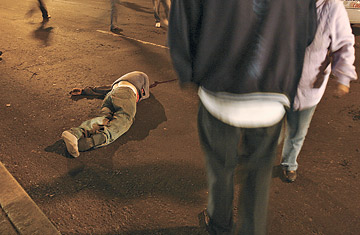
Federal Police agents arrest drug dealers during a raid in Mexico City, May 2008.
(2 of 2)
One of Mexico City's highest-profile anticrime fighters is no tough-talking mayor but a middle-aged female dentist. Maria Elena Morera, president of the lobbying group Mexico United Against Crime, led 250,000 white-clad marchers in 2004 to protest insecurity in one of the biggest demonstrations in the nation's history. The chain-smoking workaholic says she is surprised to find herself in the political spotlight instead of pulling teeth, but she felt her own personal tragedy left her no alternative. Kidnappers abducted her businessman husband in 2001, cutting off one of his fingers each week and sending it to her house. Federal agents eventually freed him and nabbed his assailants, including the medical doctor who amputated four of his fingers.
"The pain when you suffer from this kind of crime is indescribable," Morera says as she finishes taking testimony from a rape victim. "The worst thing is the powerlessness you feel. What we are trying to do is empower citizens to fight this together." Morera encourages victims to report crimes to police, and she uses her regular meetings with the mayor, police chief and President to pressure them for results. Her campaign appears to be having an effect, with 40% of citizens now reporting crimes, up from 20% 10 years ago, according to a recent survey in the Mexico City newspaper El Universal.
There is nonetheless a long way to go when the majority of offenses are still not registered, making it hard to gauge progress. A key obstacle is that many people simply don't trust the police. Officers have long been found taking bribes, and periodic cleansings of the force have not restored public confidence. Federal agents last year broke up an alleged kidnapping ring made up of Mexico City detectives from the anti-kidnapping unit. It also came as no surprise when a federal agent was arrested in connection with the killing of the nation's acting police chief, Edgar Millan, in his Mexico City home on May 8. Prosecutors allege that the offending officer, Jose Antonio Montes, was passing information about his superiors to a major drug cartel.
The shortcomings of the police have not been all bad news for business, though. Fear feeds a booming $2 billion trade in bodyguards, alarm systems, bulletproof cars and countless other ways for the wealthy to safeguard themselves. Leading the business is Grupo Multisistemas de Seguridad Industrial, which began in 1983 with one security guard watching out for cake pilferers in a bakery. It now has 7,000 employees, including armed former soldiers, special forces trained in martial arts, fleets of armored Mercedes cars and a control room that can monitor conversations inside the company's vehicles anywhere in Mexico. "We take complete responsibility for our clients' security. And we never mess up," says vice president Rafael Giménez, boasting a client list that includes top foreign diplomats, Hollywood stars and presidential candidates.
That kind of security doesn't come cheap. A gun-toting bodyguard costs $3,000 per month, while you will need $30,000 to $50,000 to make your car bulletproof--in a country where the minimum wage is $5 a day.
Many in the middle class complain that they are the biggest victims, earning enough to be robbed but not enough to buy protection. Auto-repair-shop owner Pedro Mijares knows of a fellow mechanic who was recently kidnapped and killed over a ransom. Mijares said this insecurity is the main reason he plans to move his family to California later this year. "You work hard all your life. And then these rats can come and take it away from you," Mijares says, waving his hand at his workshop full of cars. "I'm getting out of here while I'm ahead."
Too bad. He's the kind of entrepreneur that Mexico City can ill afford to lose.